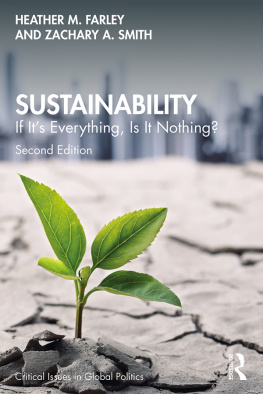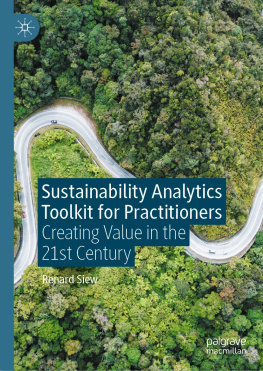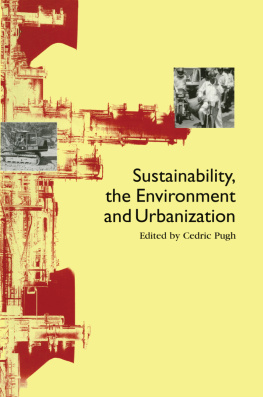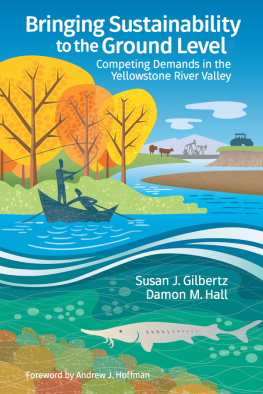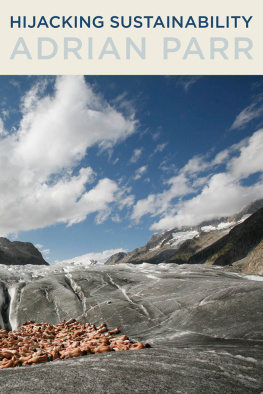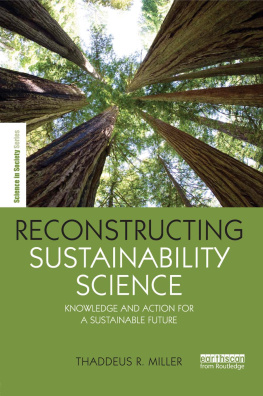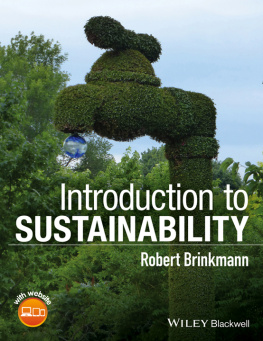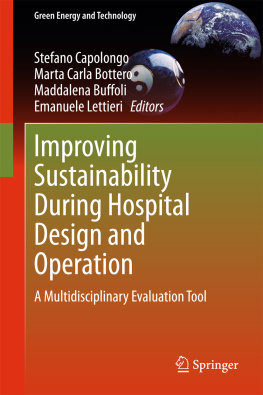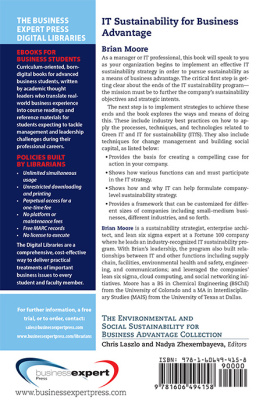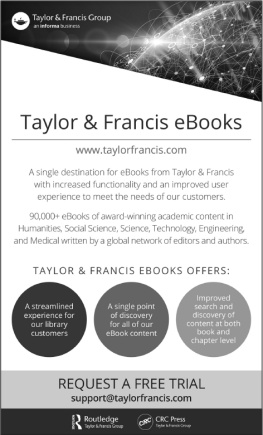Sustainability
In this second edition, the authors present new developments in the sustainability discussion and argue that a new understanding of sustainability is needed if we are to truly serve future generations ecologically, economically, and equitably.
Despite the great flurry of activity around sustainability, the concept itself remains highly contested. This book argues that a new conceptualization of sustainability is needed if we are to achieve a healthful and sustainable environment for the long term. The authors examine the uses, misuses, and abuses of sustainability and provide case studies of faux sustainability in practice. Seeking to redefine and clarify the concept and its application, they offer a new definition of sustainability what they call neo-sustainability to help guide policies and practices that respect the primacy of the environment, the natural limits of the environment, and the relationship between environmental, social, and economic systems.
Offering a comprehensive view of sustainability, this text is essential reading for all students and scholars in the field. It will also be of interest to environmental professionals and activists.
Heather M. Farley is an Assistant Professor of Public Management at the College of Coastal Georgia, USA. She has held roles as a former University Sustainability Coordinator and a Researcher at Northern Arizona University and as a Sustainability Coordinator for Sea Island in coastal Georgia.
Zachary A. Smith is a Regents Professor of Environmental and Natural Resources Policy and Administration in the Department of Politics and International Affairs at Northern Arizona University, USA.
Critical Issues in Global Politics
This series engages with the most significant issues in contemporary global politics. Each text is written by a leading scholar and provides a short, accessible and stimulating overview of the issue for advanced undergraduates and graduate students of international relations and global politics. As well as providing a survey of the field, the books also contain original and groundbreaking thinking which will drive forward debates on these key issues.
Sustainability
If Its Everything, Is it Nothing?
Heather M. Farley and Zachary A. Smith
Sovereignty as Symbolic Form
Jens Bartelson
Resilience
The Governance of Complexity
David Chandler
Globalization Revisited
Grahame Thompson
Ontopolitics in the Anthropocene
An Introduction to Mapping, Sensing and Hacking
David Chandler
Sustainability, Second Edition
If Its Everything, Is it Nothing?
Heather M. Farley and Zachary A. Smith
For a full list of titles in this series, please visit: www.routledge.com
Sustainability
If Its Everything, Is It Nothing?
Second Edition
Heather M. Farley and Zachary A. Smith
Second edition published 2020
by Routledge
2 Park Square, Milton Park, Abingdon, Oxon, OX14 4RN
and by Routledge
52 Vanderbilt Avenue, New York, NY 10017
Routledge is an imprint of the Taylor & Francis Group, an informa business
2020 Heather M. Farley and Zachary A. Smith
The right of Heather M. Farley and Zachary A. Smith to be identified as authors of this work has been asserted by them in accordance with sections 77 and 78 of the Copyright, Designs and Patents Act 1988.
All rights reserved. No part of this book may be reprinted or reproduced or utilised in any form or by any electronic, mechanical, or other means, now known or hereafter invented, including photocopying and recording, or in any information storage or retrieval system, without permission in writing from the publishers.
Trademark notice: Product or corporate names may be trademarks or registered trademarks, and are used only for identification and explanation without intent to infringe.
First edition published by Routledge 2014
British Library Cataloguing-in-Publication Data
A catalogue record for this book is available from the British Library
Library of Congress Cataloging-in-Publication Data
Names: Farley, Heather M., author. | Smith, Zachary A. (Zachary Alden), 1953 author.
Title: Sustainability : if its everything, is it nothing? / Heather M. Farley and Zachary A. Smith.
Description: Second edition. | Abingdon, Oxon : New York, NY : Routledge, 2020. | Series: Critical issues in global politics | Includes bibliographical references and index. | Identifiers: LCCN 2019050027 | ISBN 9780815357155 (hardback) | ISBN 9780815357162 (paperback) | ISBN 9781351124928 (ebook)
Subjects: LCSH: Sustainable developmentGovernment policy. | Sustainable developmentInternational cooperation. | Environmental policyInternational cooperation. | World politics.
Classification: LCC HC79.E5 F288 2020 | DDC 338.9/27dc23
LC record available at https://lccn.loc.gov/2019050027
ISBN: 978-0-8153-5715-5 (hbk)
ISBN: 978-0-8153-5716-2 (pbk)
ISBN: 978-1-351-12492-8 (ebk)
Typeset in Times New Roman
by Apex CoVantage, LLC
The authors would like to dedicate this second edition to future generations in hopes that this work might serve them well. In particular, to the wonderful young people whose lives we have personally had the pleasure of nurturing and sustaining.
In April 2010, a report of the Secretary General of the UN General Assembly stated:
the environment and development are not two separate agendas, but two faces of the same agenda. Development is the midwife of sustainability, just as sustainability is the life support system for development. At its advent over two decades ago, this idea offered tremendous excitement and hope. The time has come not only to review and assess what has been achieved on the basis of this vision, but also to build upon it and revive its promise of integration, unity and aspiration.
(2010, p. 1)
The necessity to review, assess, build upon, and revive the concept of sustainability guided the development of this book. Sustainability began as a promising, inspirational, and hope-filled worldwide endeavor but has become a buzzword, often with little more behind it than rhetoric. The idea of creating a more sustainable future for ourselves and our children through sustainable development has been widely embraced, but it is unclear whether we all have the same understandings as to what it is that we are embracing, at what costs, and under what circumstances. It cannot confidently be asserted that sustainability is universally understood.
Beyond the confusion of what is meant by sustainability, the concept has been widely abused as well. As a guiding principle, sustainability has been co-opted by numerous actors who, rather than use the concept to make transformational changes that improve environmental, social, and economic systems, have instead made the term fit their own agenda, an agenda that often has little to do with change or transformation. This business-as-usual default mode has meant that the global endeavor to employ sustainability as a development maxim is failing to close the gap between implementation and the scope of the problem. Progress has been made. More parties are discussing sustainability today, and many are implementing programs and projects that they hope will contribute to sustainable development goals. Yet the kinds of programs, the types of actions, and the degree of change are not sufficient to produce a more sustainable future.

